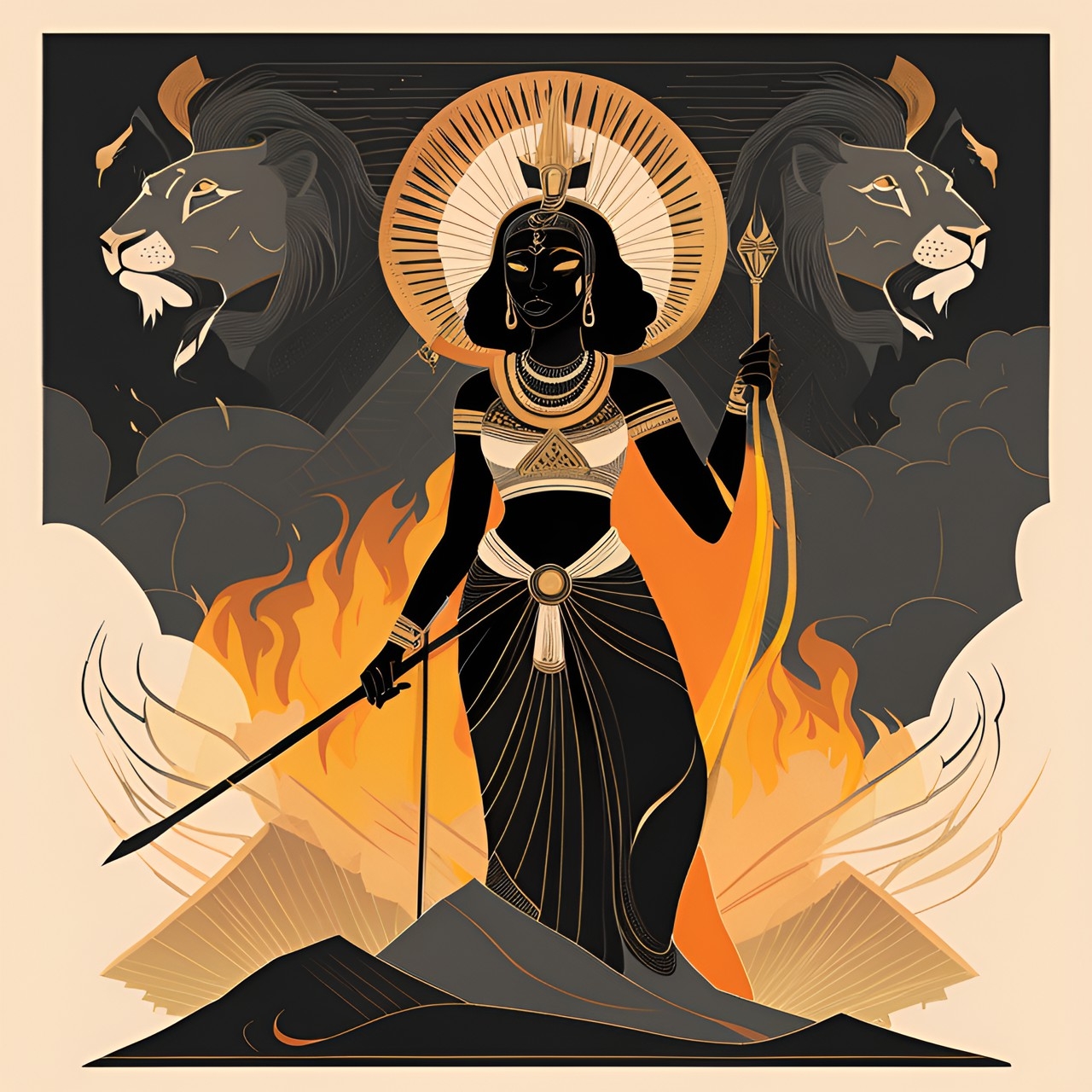
Akkadi Empire
Founding
The first empire in Birit Narim, the Akkadi Empire. These were an al-Mashriq people led by King Sarruumkiin, who conquered 34 cities himself! Akkadi stretched all the way into Kna'an, Parsa and parts of the Frozen Wastes. The royal line of Akkadi made a fatal, vain mistake: while Lithmor was abroad the king of Akkadi attacked Enkur, Lithmor's Seat and the holy temple of the gods, pilfering their offerings. The Erlithmanil appeared before the people of Akkadi, uttering a curse to them before leveling their temples and destroying their offerings.
While their founder revered the local pantheon and had the endorsement of Ferith, his descendants were less than respectful of these once deities. Some accounts even claim Sarruumkiin was a Divine Descendant of Ferith and this was why he was not only so powerful in battle but why Lithmor took no direct action against him. So fearsome in battle was Sarruumkiin that even in old age he continued to smite revolts against him, including a siege on his capital hoping to take advantage of his age. Once Rimuus came into control, he unleashed a violent campaign against the Kengir city-states, slaughtering more than 50,000 of them and enslaving or expelling nearly as many more. He even went so far as to erect monuments recording and proclaiming his genocidal exploits. Rimuus continued to struggle against rebelions until his own courtiers assassinated him. He was succeeded by his elder brother, Maanishtusu, who became renown for a naval battle against 32 kings from al-Arabiyyah. Yet he too was assassinated amid court politics. The following King Naraam Sin, Maanishtusu's son, was perhaps the most reviled. He continued his predecessor's trend of conquest and proclaimed himself Lugal Naraam Sin, Sar kibrat 'arbaim meaning King Naraam Sin, Ruler of the Four Courners, of the entire world. He was skilled in both battle and diplomacy, pushing their empire to its largest expanse. Most contriversial was his proclimation that he, and his ancestors, were not representatives of the gods but actual deities themselves. While King Birit Narim was well organized and productive during his reign, resulting in a high surplus of food and the construction of extensive public infrastructure, Naraam Sin invaded many neighboring lands and confiscated their wealth to further these advances. His attempt to deify himself pushed Birit Narim into the Great Revolt. Leading up to this, Naraam Sin began tightening his control over the city-states by sending his sons as governors and his daughters as high-priestesses--a tactic later employed by Ilnid in Khalifah al-Rasul. He kept only the most loyal to him as governors. Despite his attempts to consolidate power, a coalition formed amid his city-states and rebelled together against him. Yet much like his grandfather, Naraam Sin possessed powerful fire magic, beleived to be favored by Ferith, and emerged victorious battle after battle. It was following these victories that he proclaimed himself divine and named himself god of his capital, Akkan. Contradictory accounts recall the fall of the Akkadi empire, some claiming it was the fault of King Naraam Sin while others claim it was the mistakes of his successor. What is clear is that while Naraam Sin was unmatched in battle and diplomacy, his son and heir Sharkali Sharri proved less competant than his father. Either Naraam Sin himself or Sharkali Sharri made a fatal, vain mistake: while Lithmor was abroad the king of Akkadi attacked Enkur, Lithmor's Seat and the holy temple of the gods, and their temples, pilfering their offerings. Some claim this was Naraam Sin in a final show of arrogance. Others believe Sharkali Sharri, facing numerable rebellions and the collapse of treatise with their neighbors the Haltamti, Tidnum and Guttuum, did so as a show of force. Whichever the case, this assualt led to a complete abandonment of support from the gods. The Erlithmanil appeared before the people of Akkadi in response, Enlil (Raegeric) uttering a curse to them before leveling their temples and destroying their offerings. "May the land that destroyed Enku be treated as our temple has been treated! Heads will fill the wells and brother will not recognize brother! May young women be cruelly killed and your holy walls resound with mourning. Your grain will be grain cursed by Ezina (Barnok), your timber be timber cursed by Ningiszidda (Torrym). Akkadi, your men will be deprived of strength, laying idle all day. May this make the cities die of hunger! Your citizens will lay hungry in the grass, forcing your men to eat the coating on his roof, to chew the leather hinges on his doors. May depression descend upon your palace, once built for joy! The grass will grow long on your canal banks and highways, choking the wheels of wagons! Moreover, may wild rams and alert snakes of the mountains allow none to pass and let brackish water flow where fresh water ocne flowed for you! If someone decides, "I will rest in Akkadi", may he not enjoy the pleasures of a resting place!" The Erlithmanil denied them the honor of dying in battle or at their hand, of divine wrath, instead abandoning Akkadi and severing their elemental connections. The Akkadi people lost all Racial Magic to this curse and the lifeblood of Birit Narim, the Idiqlat and Purattu Rivers, lost its radiant light. The Akkadi had made many enemies, put down many rebellions and committed mass murder throughout their history, and without their racial magic or the protection of the gods, their enemies were quick to descend upon them. The Gutuum in particular washed across Birit Narim from the mountains and were the first to reach the city-state Akkad, sacking it and murdering King Sharkali Sharri. Even as the kingdom fell, the curse on their lands brought famine and plague, and Birit Narim descended into anarchy and chaos. Sharkali Sharri's son, Dudu, attempted to regain control alongside several other self-proclaimed kings, mainly in the northern reaches. City-states became the central power once again, King Dudu and his successor Shuturul managing to regain some authority however briefly, eventually ceding control to the Gutuum. The Gutuum had little interest in agriculture and went so far as to release all cattle from their pens, all of which resulted in famine. The Gutuum rapidly cylced through kings, some reigning for as little as 40 days. A Kengir dynasty also established itself in Unug amid this turbulent period and nomads clashed often with agriculturalists as the drought continued. Around 3/5ths of the population met their demise in this era. The Haltami were the next to rise to power, an al-Mashriq ethnic group which further caused the Kengir to diminish. Yet it was the Akkadi who finally managed to regain the favor of the gods, establishing the Babilim Empire.
|
All images were created by me using AI generator, is my own art or a combination of the two!
(AI generator is wombo dream.ai) |

